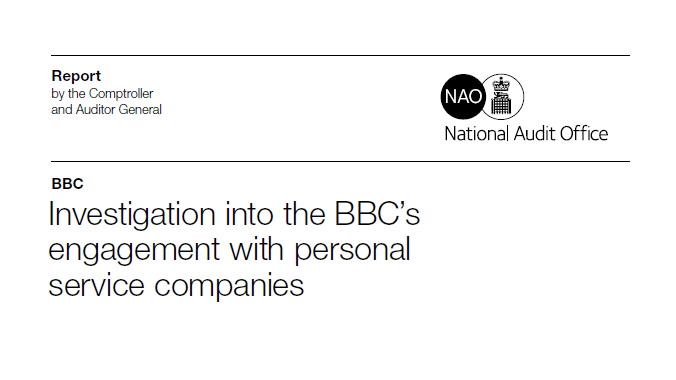Hundreds of broadcasters who followed BBC protocol to determine their employment status had it overturned by HMRC’s flawed Check Employment Status for Tax (CEST) tool, following the introduction of the Off-Payroll rules in the public sector.
This was revealed in an investigation into the BBC’s engagement with personal service companies by the National Audit Office (NAO), which shows how HMRC’s enforcement of the rules encouraged the BBC to push many of its presenters into false employment.
“This is a superb report by the NAO, which has unpicked the mess HMRC created at the BBC with the misguided Off-Payroll tax in the public sector. But this is just the tip of the iceberg,” cautions ContractorCalculator CEO, Dave Chaplin.
“We mustn’t forget about all the other public sector bodies that were strong-armed into using CEST, and who will face similar problems. It’s time that Government held a public inquiry into HMRC’s IR35 team, their behaviour towards taxpayers, their questionable published guidance and their implementation of the Off-Payroll rules.”
Hundreds of broadcasters fall victim to CEST
From November 2013 until the introduction of CEST in May 2017, the BBC used an employment test, developed with Deloitte and in liaison with HMRC, to help determine the status of its on-air freelancers. Meanwhile, the radio industry guidelines were used to assess non-news radio presenters. Using these methods, the BBC had determined the majority of on-air freelancers as self-employed.
The NAO notes that this figure contrasts sharply with the situation following the Off-Payroll changes. Having used CEST to assess the status of 663 on-air freelancers between August 2017 and June 2018, the BBC found 92% to be deemed ‘employed for tax purposes’.
Though the taxman maintains publicly that the use of CEST is optional, the report notes that the broadcaster adopted CEST after HMRC made it clear that it would stand by the tool’s decision.
“As the NAO report highlights, the taxman’s tactics are highly manipulative,” states Chaplin. “HMRC knows it can’t make use of its tool mandatory, because it fails to adhere to case law, has no legal authority, has no independent external accountability and wasn’t assessed formally by Government Digital Standards.
“However, by promising not to challenge public bodies who use CEST, HMRC has compelled many to use it. Within the BBC, this has resulted in hundreds of incorrectly assessed individuals paying the wrong amount of tax. That is nothing short of a con.”
HMRC BBC treatment looks ominous for private sector
The effects of the Off-Payroll rules and CEST have been felt by both the BBC and its presenters. The broadcasting company paid £8.3m of tax on account to HMRC between April and September 2017. This was to cover potential tax that HMRC believes should have been paid between the introduction of Off-Payroll and the point at which an individual’s status became clear later in the year.
Later the BBC would recoup this money from its broadcasters having made certain their employment status for tax purposes, even though it was still shy of £2.9m by June 2018.
The fallout has damaged the relationship between the BBC and its presenters, mainly because many set up a limited company at the BBC’s request.
The NAO report also acknowledged widespread concern among presenters that a change in their deemed employment status following a CEST assessment could expose them to retrospective HMRC investigations. By May 2018, the BBC estimated that some 800 presenters were at risk of being challenged by HMRC.
These fears have been vindicated over recent months. The HMRC has taken legal action against numerous BBC presenters, and has roughly 100 open investigations into BBC-related limited companies. The taxman maintains that a private sector implementation of the rules will not look retrospectively at affairs.
Chaplin concludes: “The state of play within the BBC, as with many other public organisations, is chaotic. The IR35 team, backed by HMRC and the Treasury, continue to publish documents claiming everything is rosy. Here we have more proof that it isn’t.
“This NAO report is indicative of the wider problems the Off-Payroll rules have created across the public sector. Any private sector rollout would be calamitous in light of what we have learnt today.
"Surely, in the wake of this report, the Public Accounts Committee should open an investigation into the behavour and practices within the IR35 team at HMRC, it's flawed CEST tool, and the impact their implementation has had on the wider public sector."

